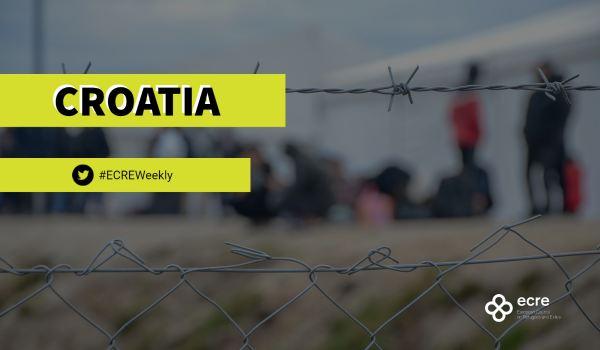A recent investigation reveals that top Croatian officials reside over a WhatsApp group used to share pictures and information on EU-funded Koridor operations. More than 100 migrants were removed from Croatia to be placed in an EU-financed detention centre in Lipa before their forced return to their countries of origin. A high-level meeting between Italy, Croatia and Slovenia is expected to be organised in the upcoming weeks to coordinate “border security”.
The overwhelming evidence of violations of the rights of people on the move in Croatia including pushbacks, torture and denial of the right to asylum had been a concern in the country’s admission into the Schengen area. Following the Council’s decision to admit Croatia to the zone, ECRE and other rights and humanitarian organisations criticised the decision for disregarding the ill-treatment of displaced people in the country and called the Croatian authorities to end border abuses, ensure full accountability for unlawful practices, and establish a credible and effective independent border monitoring mechanism. A recent investigation by Lighthouse Reports and partners revealed that top Croatian officials reside over an unofficial WhatsApp group called ‘OA Koridor II- Zapad’, in which Croatian border police shared sensitive information about apprehensions of foreign nationals, including disturbing photographs, between August 2019 and February 2020. Croatia’s Koridor operations receive millions of euros to carry out operational actions aimed at “combating irregular migration and crimes related to smuggling of people”. A recent joint ECRE and PICUM paper underlined that member states must ensure that all actions supported by EU funds are compliant with the Charter of fundamental rights and the Commission can freeze EU funding where EU-funded actions violate fundamental rights. Instead, the Commission recently approved the Croatian national programmes for border management and internal security, declaring them compliant with fundamental rights. ECRE calls on the Commission to review its assessment of these programmes and ensure that EU resources do not directly finance pushbacks and fundamental rights violations.
Around 100 people arrive to Rijeka city close to Slovenia and Italy, according to the latest report from Border Violence Monitoring Network (BVMN) for February. They stay in Rijeka for one or two night before heading to Italy via Slovenia. BVMN says “This change in arrivals might be related to the so-called “7-dayspaper”, a colloquial term used for the expulsion papers” that Croatian authorities began issuing in 2022 to demand people to leave the country within seven days. The report also underlines that despite criminalization of assisting people on the move, locals managed to build a permanent emergency hub near the train of Rijeka. Italy recently called for a “high-level meeting” with Croatia and Slovenia “to discuss ways to tighten border controls” due to the rise in arrivals in Rijeka city. “We are looking at ways for Italy, Slovenia and Croatia to jointly secure the external Schengen border”, said Italian Foreign Minister Antonio Tajani.
Meanwhile, Croatian authorities removed more than 100 migrants in late March and sent them in buses to Bosnia and Herzegovina (BiH). Reportedly, the Prime Minister of Una Sana Canton Mustafa Ruznic sent an open letter to Bosnia’s state security and foreign ministers, as well as to the head of the Foreigners Affairs Service, demanding an explanation for the increased number of migrants and refugees reportedly returned from Croatia to Bih. Ruznic raised concerns about the placement of the forcefully deported migrants in the EU-funded detention facility which was opened in the Temporary Reception Centre in Lipa. “It is impossible that no one knows anything, and that large groups of people are returning to Bihac under official police escort, and that an area fenced off with a large wire has been built in the Lipa centre”. Una-Sana Canton police spokesperson Bahrudin Dzelalagic told media on 6 April: “Only yesterday, 37 migrants were deported back to Bosnia and Herzegovina, and we have noticed an increased presence in the city…We do not have information on how many of them are in the detention centre”. EU’s Neighborhood and Enlargement Commissioner, Olivér Várhely said in late November 2022 during the signing ceremony of the cooperation agreement between BiH and the IOM on voluntary and forced returns: “We need to keep our detention facilities in Lipa and the region under control, meaning that the fake asylum-seekers must be detained until they return to their countries of origin”. Furthermore, the No Name Kitchen collective shared documents showing that the Croatian authorities send documents to removed migrants requesting them to pay the cost of their forced removal. The Council of Europe’s anti-torture committee underlined in its latest report that collective expulsions are prohibited under the European Convention on Human Rights.
For further information:
- ECRE, ECRE and PICUM Policy Note: Fundamental Rights Compliance of Funding Supporting Migrants, Asylum Applicants and Refugees Inside the European Union, March 2023
- ECRE, Balkan Route: Arrivals to EU Up – Pushbacks and Violations Continue, ECtHR Rulings Against Hungary and Croatia, January 2023
This article appeared in the ECRE Weekly Bulletin. You can subscribe to the Weekly Bulletin here.

